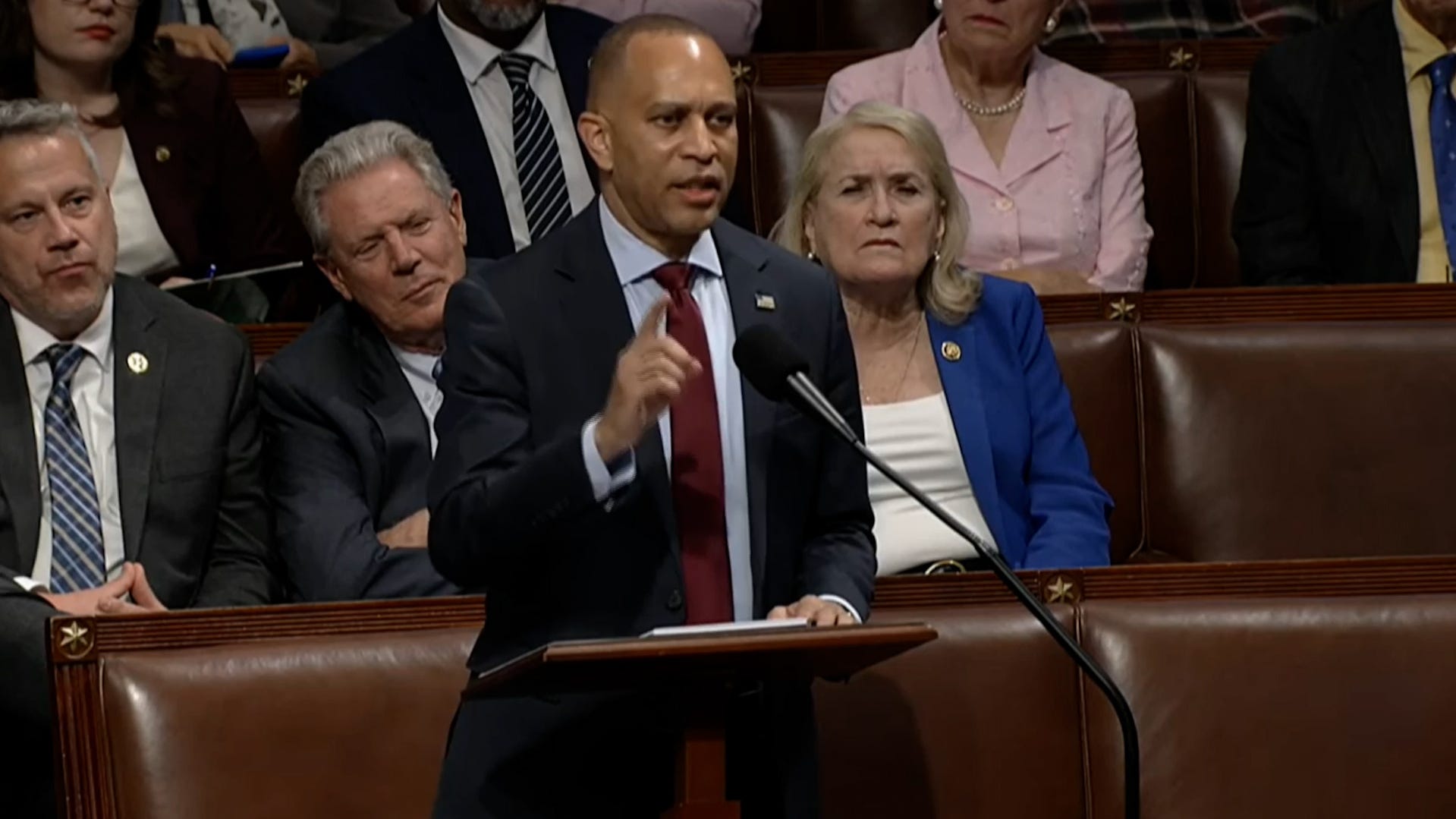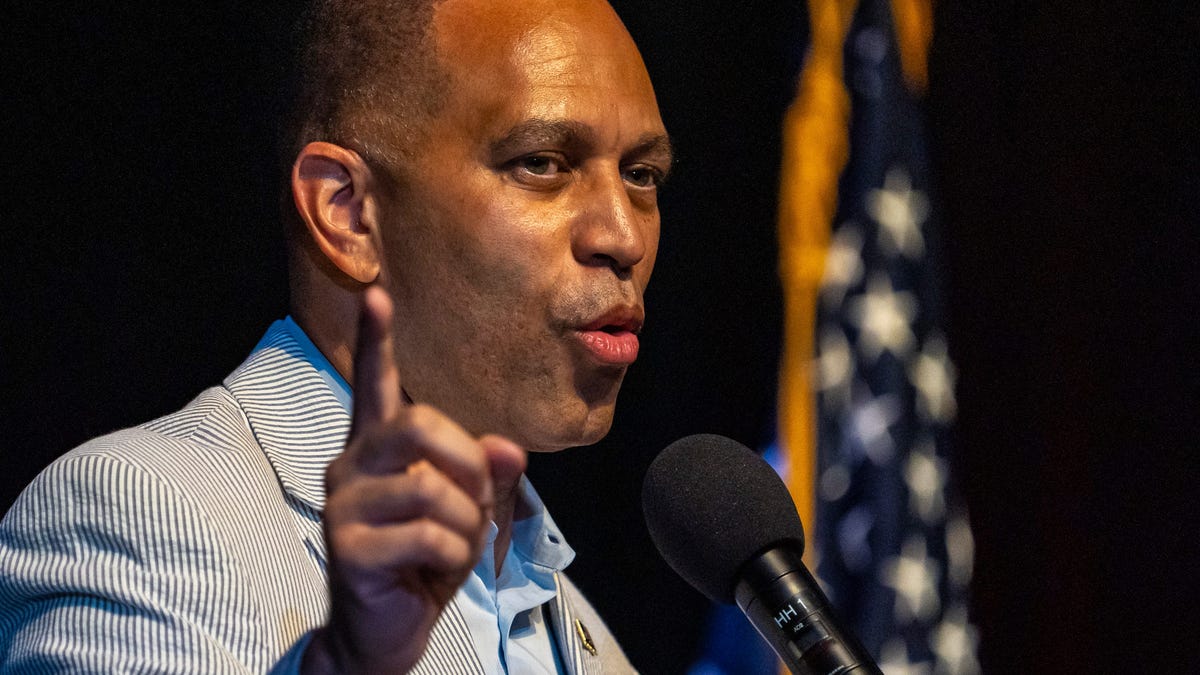
Democratic Rep. Hakeem Jeffries halts vote with marathon speech
Democratic Rep. Hakeem Jeffries is holding up the House vote on Trump’s sweeping tax, spending and policy bill with a “magic minute” speech.
On the eve of America’s 250th birthday, House Minority Leader Hakeem Jeffries, D-New York, did all he could to delay what looks to be the inevitable passage of President Donald Trump’s sweeping tax and domestic policy bill.
Jeffries, stymied with legislative options to block Trump’s signature “big beautiful bill” took his efforts to the court of public opinion, seizing the microphone on the House floor in a record-breaking marathon speech.
The Democratic leader started his protest speech shortly before 5 a.m. and ending at around 1:30 p.m. on July 3 as House Republicans continue to hammer out the proposal that would extend the 2017 tax cuts, boost military and border security spending and make an estimated $1 trillion cut to Medicaid and other programs meant to help the poor and working-class.
“I rise today in strong opposition to Donald Trump’s disgusting abomination… that guts Medicaid, rips food from the mouths of children, seniors and veterans, and rewards billionaires with massive tax breaks,” Jeffries said.
Jeffries was surrounded by stacks of binders at the podium, which indicated he planned to extend the debate as long as possible, but the Trump administration and congressional Republicans maintain they have enough votes to cross the finish line.
Here are some key things to think about in the final hours of the bill’s debate.
Jeffries using ‘magic minute’ is part of Democratic resistance plan
As the party out of power in every part of the federal government, Democrats don’t have many options in terms of stopping Trump’s bulldozer in Washington.
Instead of defeating the bill, Jeffries sought to rally national outrage over Trump’s measure — which 55% of registered voters oppose, according to a Quinnipiac University poll released June 26 — by using a procedural tactic known as the “magic minute” that gives the House leaders unlimited speaking time on the floor.
“People will die,” Jeffries said. “I’m sad. I never thought that I’d be on the House floor saying this is a crime scene. And House Democrats want no part of it.”
The speech is similar to the one Sen. Cory Booker, D-N.J., did in April that lasted for 25 hours and 5 minutes and broke the Senate record.
It is unclear if Jeffries’ talk-a-thon got the same level of online attention as Booker’s speech did, but he used it to pick apart the mega-bill and other parts of Trump’s agenda, including the focus on illegal immigration.
Jeffries said at one point that Democrats support fixing the country’s “broken” immigration system and booting those who commit crimes out of the U.S., but that his party opposes targeting law-abiding immigrant families, such as a 2-year-old girl born to two undocumented immigrants in Florida who was deported to Brazil by the administration earlier this year.
The 54-year-old House Democratic leader’s speech outpaced the previous record set by former Rep. Kevin McCarthy, who as the GOP leader in 2021 spoke against a Democratic spending measure.
He spoke for 8 hours and 32 minutes.
Jeffries spoke for 8 hours and 44 minutes in total
“I’m still here to take my sweet time,” Jeffries said at one point.
For much of this year Democrats and their progressive allies have been searching for different ways to regain voters’ confidence and stop Trump’s winning streak, whether by using congressional procedures or crashing press conferences held by administration officials.
Vance scoffs at delay tactic as White House reschedules signing ceremony
Republicans weren’t deterred by Jeffries’ protest speech, however, even as the White House reportedly changed plans on what day and time Trump will hold a ceremonial signing of the mega-bill.
“We have the votes,” House Speaker Mike Johnson, R-Louisiana, who was working in the wee hours of the morning herding votes, told reporters on July 3.
Vice President JD Vance took to X, formerly known as Twitter, suggesting the Democratic leader’s speech is having the opposite effect than what progressives wanted.
“GOP Congressman just texted me: ‘I was undecided on the bill but then I watched Hakeem Jeffries performance and now I’m a firm yes,'” Vance said in a July 3 post.
Other White House aides and Republican lawmakers are mocking the marathon speech, too.
Dan Scavino, a longtime Trump adviser and deputy chief of staff, posted a portion of Jeffries talking about stripping parts of the Affordable Care Act featuring the president playing an off-tune version of “My Heart Will Go On” on a flute.
“When I listen to Hakeem Jeffries, it drives me bananas,” Rep. Andy Ogles, R-Tennessee, said on “The Benny Show” while mocking the minority leader’s speaking style. “Just talk man. I know he can talk. I’ve heard him on the House floor, but this whole fake thing that he does with his hands — are you doing sign language; are you rapping; are you trying to talk to us? Pick a lane.”
Polling shows Americans largely oppose Trump’s mega-bill
In many ways Jeffries’ speech is a kickoff to the 2026 midterms, which Democrats are hoping can give them the majority in a razor-thin Republican-controlled House.
Various surveys have shown significant margins of U.S. adults don’t like or don’t know enough about the legislative package.
A Washington Post-Ipsos survey released on June 6 found 42% of Americans oppose “changing tax, spending and Medicaid policies” versus 23% who support the bill. But it showed 34% of the country, including 42% of independent voters, had no opinion.
The Quinnipiac poll released earlier this week showed 28% of Americans say they have heard or read either not too much or not much at all about the bill. Other public surveys from Fox News; Pew Research Center and the Kaiser Family Foundation have the mega-bill underwater with voters, too.
The Democratic Congressional Campaign Committee, the House Democrats’ campaign arm, is hoping to fill that gap and circulated a strategy memo on July 1, saying it plans to “so-called moderates” in the GOP caucus.
“Polling consistently shows that the more the public hears about the GOP tax scam, the less popular it becomes,” the memo says.
Some elements of the bill that Democrats are criticizing the most are getting higher marks, however, such as the conservative reform to install new work requirements on Medicaid benefits.
Under the measure, able-bodied adults under 65 years of age must prove they are working or volunteering 80 hours a month.
The Quinnipiac survey found 47% of voters support that idea versus 46% who oppose it, whereas the Pew poll found nearly half of Americans favored it compared to 32% who are opposed.
“Shame on this institution if this bill passes,” Jeffries said.
Contributing: Savannah Kuchar, Sudiksha Kochi and Joey Garrison







